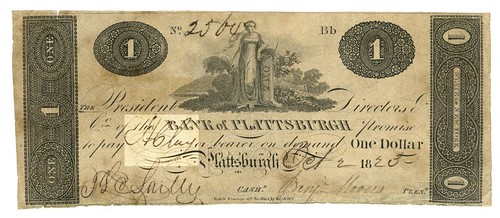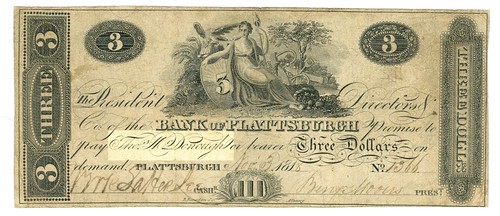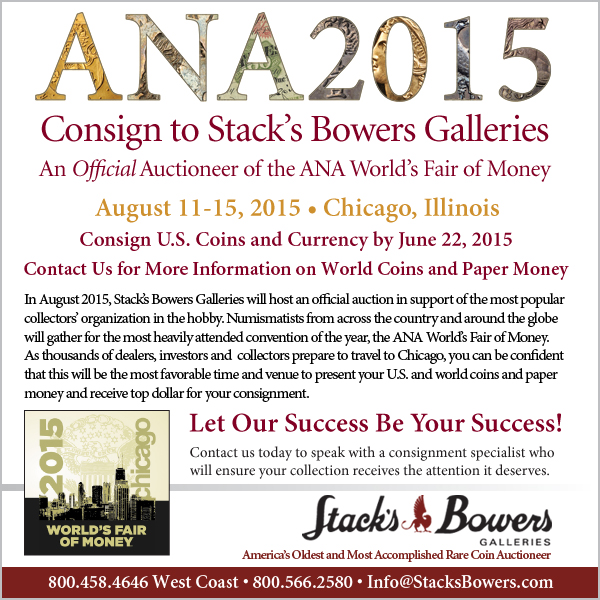
PREV ARTICLE
NEXT ARTICLE
FULL ISSUE
PREV FULL ISSUE
QUERY: WHY ARE FAMOUS NAMES USED ON OBSOLETE BANKNOTES?
Chris Neuzil submitted an interesting question about names on obsolete banknotes. Thanks. -Editor
Banknotes aren't my thing, really, but personal connections to Plattsburgh, NY led me to accumulate several early 19th century obsolete notes from that city. As is formulaic, these Bank of Plattsburgh notes promise "to pay (name) or bearer" so many dollars, etc. What caught my attention were the "names." They include "H. Clay," "H. Gates," and "Thos McDonough," the last apparently being Thomas Macdonough, hero of the 1814 Battle of Plattsburgh. H. Clay and H. Gates I take to be Henry Clay and Horatio Gates, the latter also having a local connection as victor at Saratoga in the Revolution. Sometimes the names are on the plate, sometimes handwritten. Was invoking names of national figures done to promote acceptance of the notes? Is this a recognized practice among banks of the era? I first thought the Macdonough notes were part of a gift to him by public subscription (many victorious commanders were given lavish gifts, but cash?). What then of the other names? Horatio Gates was dead (1806) by the time the notes with his name were issued in in 1818 - 1824. I also have ten dollar notes of The Manufacturers Exchange Company of Bristol CT invoking "S. Decatur" and "T. Macdonough." This Macdonough note carries an issue date of Sept. 20, 1814, just 9 days after Macdonough's victory at Plattsburgh! To close, some details about Bank of Plattsburgh: Niles' Register of July 24, 1819 - "The bank of the famous and favorite town of Plattsburgh, has not suspended specie payments, as reported on the authority of an Albany paper." Then on July 31, 1819 - "The bank of Plattsburgh has commenced a suit against the editor of the Albany Gazette, for saying that it had stopped payment." And on Dec. 31, 1825 - "The banks of Niagara and Plattsburgh have closed their doors. The failure of the last is attributed to the misapplication of a large sum of money by one of the directors." I'm attaching pictures of two notes - names highlighted. 

Should any contemporary bank records remain, they may hold the details of the transactions that led to the creation of these notes. I
believe Clay, Gates and Macdonough would have been depositors in the bank. This is fitting for that era for only the wealthy had enough
money to hold an account. The bank in turn would give notes such as these to the depositors, perhaps in payment of interest or occasional
withdrawals. Since they are payable to the bearer of the note, they could be spent into the local economy. The bank remained solvent for
several years, and only those caught with the notes after its failure were out of luck.
Other E-Sylum readers may have thoughts on the practice. -Editor 
Wayne Homren, Editor The Numismatic Bibliomania Society is a non-profit organization promoting numismatic literature. See our web site at coinbooks.org. To submit items for publication in The E-Sylum, write to the Editor at this address: whomren@gmail.com To subscribe go to: https://my.binhost.com/lists/listinfo/esylum All Rights Reserved. NBS Home Page Contact the NBS webmaster 
|